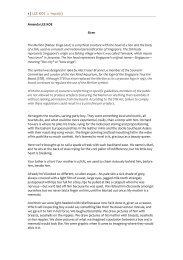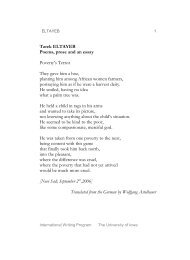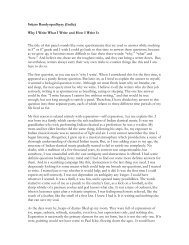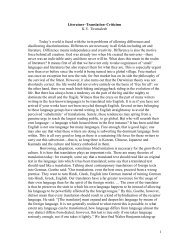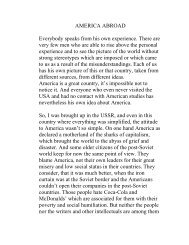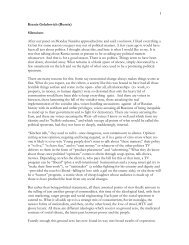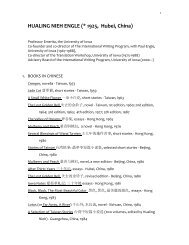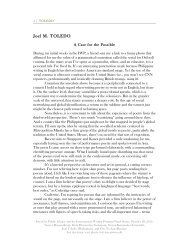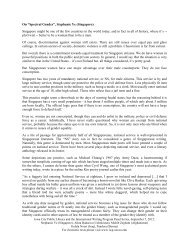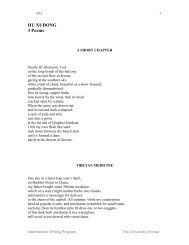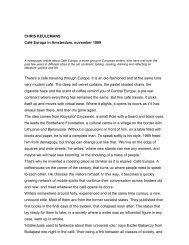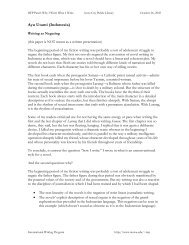Dorothy TSE Hiu Hung - International Writing Program
Dorothy TSE Hiu Hung - International Writing Program
Dorothy TSE Hiu Hung - International Writing Program
You also want an ePaper? Increase the reach of your titles
YUMPU automatically turns print PDFs into web optimized ePapers that Google loves.
1 | <strong>TSE</strong><br />
<strong>Dorothy</strong> <strong>TSE</strong> <strong>Hiu</strong> <strong>Hung</strong><br />
<strong>Writing</strong> Between Languages<br />
What is a foreign language, and what is a native one? Are the boundaries clear?<br />
Living in Hong Kong is an experience of living in several languages. Every road sign that<br />
appears on the street of this city is written in both Chinese and English. English was long the<br />
official language for this former British Colony. It is still a medium of instruction as well as a<br />
common language used in the commercial sector. We use the rapidly changing Cantonese to fill<br />
up the daily dialogue, yet we automatically shift into English when we reply to an email. The first<br />
language I learned from my parents and forgot gradually as I grew up is, in fact, the Chaozhau<br />
dialect. Parents who were immigrants from mainland China in the earlier days still talk to us in<br />
their specific Chinese dialect when people of my generation return home. With the handover of<br />
Hong Kong from the British to the Mainland Chinese in 1997, Mandarin has its growing<br />
importance in the commercial and political sector. Now we are trying very hard to practice a<br />
language that we are unfamiliar with. To us, hovering among languages is also hovering among<br />
different roles and identities.<br />
So are we writing in a mother tongue when we write in Chinese? Do we feel at home? The<br />
standard written Chinese we use nowadays is a language which is developed from the “written<br />
vernacular Chinese”(白話文)introduced in the New Cultural movement to replace classical<br />
Chinese about a hundred years ago. It is a written vernacular based mainly on Mandarin. Most of<br />
the people of Hong Kong would not regard it as easier to write in Chinese than English. To us,<br />
this written Chinese is neither Mandarin nor Cantonese. It is a language that one learns directly<br />
from printed matters, a language pronounced in Cantonese yet with a very different vocabulary<br />
and grammatical rules. So when we start to write, we are already being detached from our daily<br />
life; we are already somebody else.<br />
Using a language that is not taken for granted should be regarded as a good opportunity and<br />
not a detriment to writing. It is a language of distance and requires meditation.<br />
In the book, Hong Kong: Culture and the Politics of Disappearance, Ackbar Abbas<br />
described Hong Kong’s culture as “decadence.” He defined this term by describing an energy<br />
that gets largely channeled into one direction, the economic sphere. As Abbas said, “Historical<br />
imagination, the citizen’s belief that they might have a hand in shaping their own history, gets<br />
replaced by speculation on the property or stock markets, or by an obsession with fashion or<br />
consumerism.” It is difficult for one to explain his identity as a writer in Hong Kong. For most<br />
people in Hong Kong, local literature does not even exist. Reading “serious” literature is such an<br />
embarrassing act that a public intellectual once said he had to hide his book behind a porn<br />
magazine while reading on public transportation. Rather paradoxically in such a commercial city,<br />
Iowa City Public Library and the <strong>International</strong> <strong>Writing</strong> <strong>Program</strong> Panel Series, September 16, 2011:<br />
Ajit Baral (Nepal), Alexandra Petrova (Italy),<br />
Nell Regan (Ireland) and <strong>Dorothy</strong> Tse (Hong Kong)<br />
For electronic texts please visit www.iwp.uiowa.edu
2 | <strong>TSE</strong><br />
the boundary between literature and the popular culture is distinct.<br />
In the field of literature, “written vernacular Chinese” has undergone great changes in<br />
different Chinese-speaking regions since 1949 when the communist government ruled over<br />
mainland China. For instance, contrary to the mainland literature that tried to borrow languages<br />
from the working class as well as the farmers in the 50s as a way to reach the public, Hong Kong’s<br />
literature has a tradition of resistance to the language of daily life. Its highly experimental language<br />
is a strategy to distinguish a literary work from an entertaining and commercial one. In Hong<br />
Kong, writing itself is an active rejection of utilitarian society and mundane everyday life.<br />
Take The Drinker , a novel written by a Hong Kong writer Liu Yichang(劉以鬯) in the 60s,<br />
as an example. It is regarded as the first Chinese novel to adapt the technique of stream of<br />
consciousness. The first person narrator modeled on the writer was a man of high literacy who<br />
came from Shanghai during the Chino-Japanese War. He, once an editor of a literary magazine,<br />
was forced to write pornographic novels in Hong Kong in order to make a living. He could only<br />
express his view on literature when he was drunk in a fragmented yet poetic language. This<br />
experimental language is not only created to simulate the stream of consciousness of the drinker,<br />
but also to provide a space for one to escape from the reality of everyday life and the trapped self.<br />
To escape from a commercial city under British rule does not imply the identification with<br />
a Chinese nationality or traditional Chinese culture. While there were heated debates over<br />
“motherland literature” (鄉土文學)during the 70s in Taiwan, and there was a cultural and<br />
literary movement named “root-searching”(尋根)in the 80s in mainland China, the image of<br />
land or soil seldom appears in Hong Kong’s literature. In Hong Kong, writing is never an act that<br />
naturally brings one to the theme of nationality or cultural tradition.<br />
Instead of motherland, the “floating city”(浮城)is a widely accepted image introduced by<br />
Xi Xi (西西) in her famous short story written during the 80s, which borrows from a painting<br />
by Rene Magritte to describe Hong Kong’s situation of in-betweenness. As described in the story,<br />
it is a city that hangs in the sky between the clouds above and the sea below—that is, China and<br />
Britain, respectively.<br />
It is the writer’s language that should be described as floating as well, a language that is in<br />
between. It is dangerous to hang in the sky, yet it is this dangerous situation that makes the<br />
miracle of a city, as well as its literature, possible.<br />
____<br />
Iowa City Public Library and the <strong>International</strong> <strong>Writing</strong> <strong>Program</strong> Panel Series, September 16, 2011:<br />
Ajit Baral (Nepal), Alexandra Petrova (Italy),<br />
Nell Regan (Ireland) and <strong>Dorothy</strong> Tse (Hong Kong)<br />
For electronic texts please visit www.iwp.uiowa.edu



